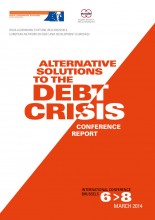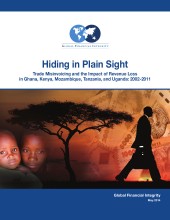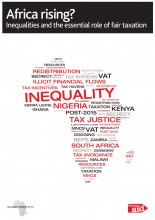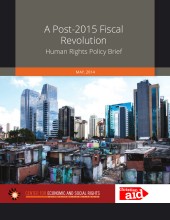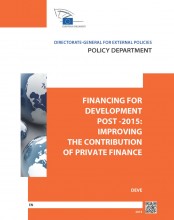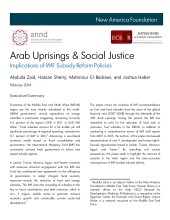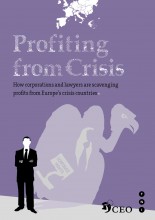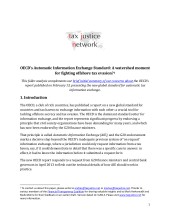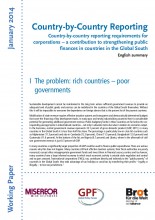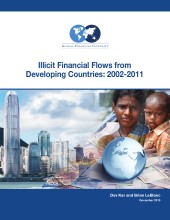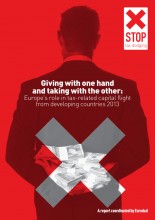Eurodad in collaboration with the Rosa-Luxemburg-Stiftung published a report summarizing a conference on alternative solutions to the debt crisis in Europe. Though increasingly questioned by economists, civil society and politicians, austerity policies still form the main instrument to rescue and restart European economies. The conference aimed at developing more equitable and just solutions to the crisis. Experts from Europe, the Middle East and North Africa as well as Latin America contributed and thus enabled the participants to share experiences also [...]
Development Finance & Tax Justice - Archive
The culture of concealment throughout the FTSE
„Secrecy is not the exception but the norm […]” is the major finding of a report published by Christian Aid analyzing the disclosure of economic and financial information of almost 30,000 subsidiaries of the 100 largest companies whose shares are traded on the London Stock Exchange (the FTSE100). More than 90% of these subsidiaries are based in secrecy jurisdictions, only a quarter of them fully reveal information on turnover, assets, shareholder funds and number of employees. Data that is vital [...]
Trade Misinvoicing and the Impact of Revenue Loss in Ghana, Kenya, Mozambique, Tanzania, and Uganda: 2002-2011
Global Financial Integrity published a report funded by the Ministry of Foreign Affairs of Denmark analyzing the impact of trade misinvoicing on Ghana, Kenya, Mozambique, Tanzania, and Uganda. According to the report, under- and over-invoicing of trade transactions in the period between 2002 and 2011 caused a loss of US$ 14.39 billions in tax revenues in the five Sub-Saharan African countries. This means that governments lose a huge amount of their annual budget which could otherwise be spend on education [...]
A new report by Tax Justice Network-Africa and Christian Aid asks who benefits after a decade of economic growth in Sub-Saharan Africa. Despite increasing economic prosperity and some positive achievements in poverty reduction too many Sub-Sahara African countries undergo sharp rising income inequality. The report examines eight countries and whether they experiences rising inequalities. By looking at this, the researchers underline the primary importance of the relationship between national tax systems and international taxation issues in redistributing wealth. It is [...]
Human Rights Policy Brief
As the negotiation of the post-2015 development agenda further evolves from broad ideas to more and more specific targets, the question of how to sufficiently finance sustainable development becomes increasingly important. Prior to the 11th session of the Open Working Group (OWG) on Sustainable Development Goals between May 5 and May 9 organizations Center for Economic and Social Rights (CESR) and Christian Aid published a policy briefing tackling exactly this issue. In order to ensure sufficient, equitable and accountable financing [...]
At the Special High-Level Meeting of the Economic and Social Council (ECOSOC), held in New York on April 14-15, 2014, governments disscussed about features of new development goals which will replace the Millennium Development Goals in 2015. Commitments to financing the new goals are expected to play an important role in those negotiations. In this regard, human rights organizations argue that human rights should inform commitments to finance the new development agenda.
Improving the Contribution of Private Finance
New report on "Financing for Development Post-2015: Improving the Contribution of Private Finance" commissioned by the European Parliament's Committee on Development and co-written by Eurodad, Development Finance International, A&J Communication Development Consultants and Development Initiatives finds that global public finance cannot be directly substituted by private finance, as it pays for public goods, is more predictable and counter-cyclical, and can be targeted at the poorest countries. Global private finance mainly goes to higher income countries and has difficultly targeting MSMEs [...]
Civil Society Organisations participating in an outreach event of the UN Intergovernmental Committee of Experts on Sustainable Development Financing on “Co-Creating New Partnerships for Financing Sustainable Development” in Helsinki issued a statement on what they perceive as key elements of the experts committee's work. The CSOs underline that there is “need to act now. […] To put the world on track for a sustainable future, all actors have to contribute to sustainable development. We need financing of good quality and [...]
A recently published book adds further insights into the political economy of offshore jurisdictions. It raises questions about why offshore has been off-limits for serious political discussion for so many decades. What is the importance of the offshore economy? Is online Gambling a Game Changer to Money Laundering? What is the rationale behind the Secrecy Index of Tax Justice Network? How does Automatic Tax Information Exchange work? Is Austria a tax haven? With which ideology and with which narratives was [...]
on “Co-Creating New Partnerships for Financing Sustainable Development
On April 3-4, 2014 the Intergovernmental Committee of Experts on Sustainable Development Financing holds a consultation on "Co-Creating New Partnerships for Financing Sustainable Development" in Helsinki, Finland. This committee was established by the outcome document of the Rio+20 conference, which called for committee of experts tasked with preparing a report "proposing options on an effective sustainable development financing strategy to facilitate the mobilization of resources and their effective use in achieving sustainable development objectives".
In a statement for the occasion [...]
Tax Justice Focus
The Tax Justice Network has released its latest newsletter - this time a special edition on Country by Country reporting edited by Richard Murphy, whom you might call the godfather of this accounting idea. He has brought together different authors from the OECD, the Confederation of British Industry, from Global Witness and Eurodad. Together they present a unique picture of the current state of the campaign for country-by-country reporting throughout the world.
The Arab NGO Network for Development, in collaboration with the Egyptian Center for Economic and Social Rights and the New America’s Middle East Task Force, recently conducted a study of IMF recommendations to Arab governments, particularly those pertaining to austerity measures and subsidy regimes. The report is based on systematic reviews of IMF staff reports on transitioning Arab countries – Tunisia, Morocco, Jordan, Yemen and Egypt – and consultations with regionally-based civil society organizations and thought leaders.
How corporations and lawyers are scavenging profits from Europe’s crisis countries
Since the economic crisis hit Europe, international investors have begun suing EU countries struggling under austerity and recession for a loss of expected profits, using international trade and investment agreements. This is revealed by a new report released today by the Transnational Institute and Corporate Europe Observatory. The investors – and the lawyers involved – are scavenging for profits amidst crisis-hit nations, providing a salutary warning of the potential high costsof the proposed trade deal between the US and the [...]
The OECD has published a report on a new global standard for countries and tax havens to exchange information with each other: a crucial tool for tackling offshore secrecy and tax evasion. The report represents significant progress by endorsing a principle that civil society organisations have been demanding for many years, and which has now been endorsed by the G20 finance ministers. In reaction to the report by the OECD, Tax Justice Network (TJN) publishes an analytic response on whether [...]
What's the alternative? Experts from across the world gather to discuss solutions to the debt crisis
As the lion’s share of the world’s nations suffer from austerity policies, politicians, financial experts and civil society activists came together this month for a three-day international conference to discuss alternative ways of tackling the debt crisis. Themes included debt restructuring options for countries suffering from high debt burdens, the value of carrying out debt audits to help identify and repudiate illegitimate debt, the problems caused by the tight mandates of central banks, and options how to bring interest rates [...]
Last weekend's G20 finance ministers’ meeting produced an eye-catching (but detail-free) promise to raise global growth levels, but obscured the fact that little concrete progress has been made, with IMF reform mired in US inaction, no proposals for systemic reforms such as debt workout mechanisms, and a reliance for implementation on international institutions such as the OECD that exclude developing country participation.
MPs of the European Parliament from the Economic and Monetary Affairs (ECON) and Civil Liberties, Justice and Home Affairs (LIBE) Committees voted in favour of public registries which would provide information on the real, or ‘beneficial’, owners of companies. The long-awaited vote, which recommends significant improvements to the EU’s Anti-Money Laundering Directive (AMLD) and would make it much harder for criminals to launder their money using European companies.
Will developing countries be left out?
Today the OECD presented its report on a new global standard for countries and tax havens to exchange information with each other, a new tool for fighting the scourge of tax evasion. The report contains many positive elements but falls far short of what the world’s citizens desperately need – especially citizens in poorer countries.
Discussion Note on "Women, Work, And The Economy"
In this second of a two part series on the International Monetary Fund (IMF) Discussion Note on 'Macroeconomic Gains From Gender Equity' feminist economists Prof. Stephanie Seguino with Associate Prof. Elissa Braunstein and Dr. Anit N. Mukherjee take a look at the some of the shortfalls in the report related to gender wage gap, how macroeconomic policies perpetuate gender inequality, female labour force participation rate and unpaid care work.
Country-by-country reporting requirements for corporations – a contribution to strengthening public finances in countries in the Global South
A new working paper by Global Policy Forum, MISEREOR and Brot für die Welt sheds light on how greater corporate transparency can help overcome the dependence by countries in the Global South on foreign donors and mobilize sufficient government revenue to provide an adequate level of public goods. Corporations have devised various ways of getting their money out of a country without paying tax. If transnational companies are to be more honest in their tax affairs, their payment flows must [...]
The International Budget Partnership (IBP) has launched a special issue of its newsletter that focuses on budgeting for environmental sustainability. In his contribution, Jens Martens, Director of the Global Policy Forum lines out the idea of 'Sustainable Development Budgets' and their key role as an integral part of the post-2015 agenda. Moreover articles include examples of what countries are doing to “green” their budgets in Philippines and Canada and what shall be done about environmentally harmful subsidies.
Close relatives of China’s top leaders have held secretive offshore companies in tax havens that helped shroud the Communist Party elite’s wealth, a leaked cache of documents reveals. The confidential files include details of a real estate company co-owned by current President Xi Jinping’s brother-in-law and British Virgin Islands companies set up by former Premier Wen Jiabao’s son and also by his son-in-law.
Assessing how loans are reported as development aid
A new report by Eurodad's Stéphanie Colin deal with the issue of concessional loans in development finance. In the context of tighter budgets in OECD-DAC countries governments are looking for methods to increase official development assitance (ODA) levels without budgetary implications. One way of doing this is reporting a larger share of loans to developing countries as ODA. Other measures in this directions are ideas to leverage development resources by 'blending' public with private funds. The report discusses the main [...]
2002-2011
Crime, corruption, and tax evasion drained US$946.7 billion from the developing world in 2011, up more than 13.7 percent from 2010. These findings by Washington based Think Tank Global Financial Integrity, which peg cumulative illicit financial outflows from developing countries at US$5.9 trillion between 2002 and 2011 are part of a new study. "As the world economy sputters along in the wake of the global financial crisis, the illicit underworld is thriving – siphoning more and more money from developing [...]
CSOs urge European leaders to take further action against tax dodging
European leaders should use their meeting this week to agree further action against tax dodging by multinationals, CSOs urge in a new report. The report: ‘Giving with one hand and taking with the other: Europe’s role in tax-related capital flight from developing countries 2013’ reveals the state of money laundering, tax avoidance and tax evasion, and the extent of government action against them, across 13 EU Countries.

